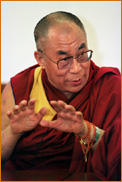
The Qualities of a TeacherHis Holiness the Dalai Lama
Take the cases of Naropa
and Marpa, for example.
Sometimes it appears as though some of the things Tilopa
asked of Naropa, or Naropa asked of Marpa, were
unreasonable. Deep down however these requests had good meaning.
Because of their great faith in their Gurus, Naropa and Marpa
did as intended. Despite the fact that they appeared
to be unreasonable, because the teachers were qualified, their
actions had some meaning. In such situations it is necessary
from the disciple’s side that all of the actions of the teacher
be respected. But this cannot be compared to the case of ordinary
people. Broadly speaking, I feel the Buddha gave us complete
freedom of choice to thoroughly examine the person who is to
be our Guru. This is very important. Unless one is definite,
one should not take someone as a Guru. This preliminary examination
is a kind of precautionary measure.
|
 Birth, Life & Death
Birth, Life & Death


186,104 people have liked our site's pages and shared them with their Facebook friends - Most Shared Pages
© 2025 Copyrighted materials used with the permission of The Avataric Samrajya of Adidam Pty Ltd, as trustee for The Avataric Samrajya of Adidam. All rights reserved. None of these materials may be disseminated or otherwise used for any non-personal purpose without the prior agreement of the copyright owner. ADIDAM is a trademark of The Avataric Samrajya of Adidam Pty Ltd, as Trustee for the Avataric Samrajya of Adidam.
Technical problems with our site? Let our webmaster know.